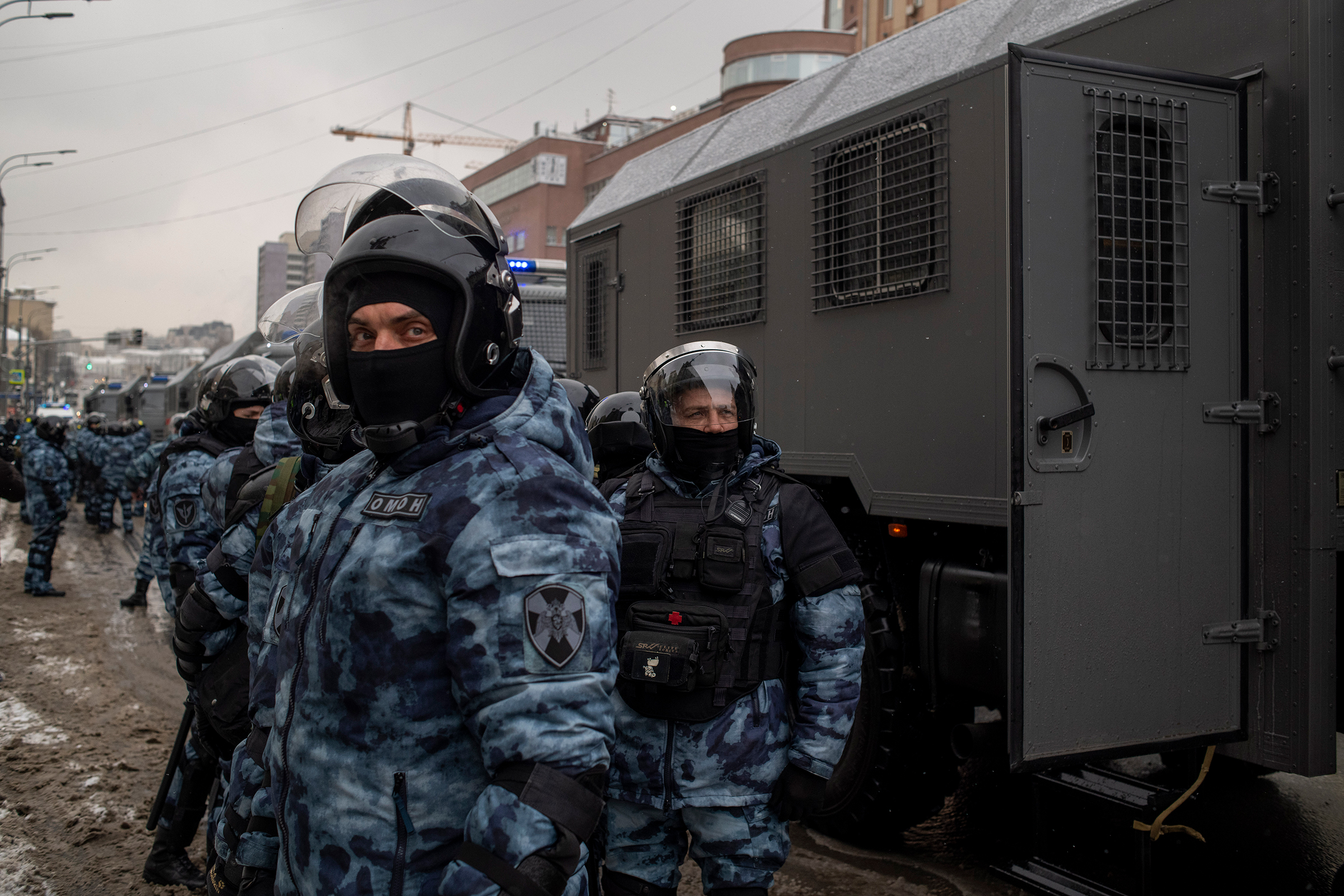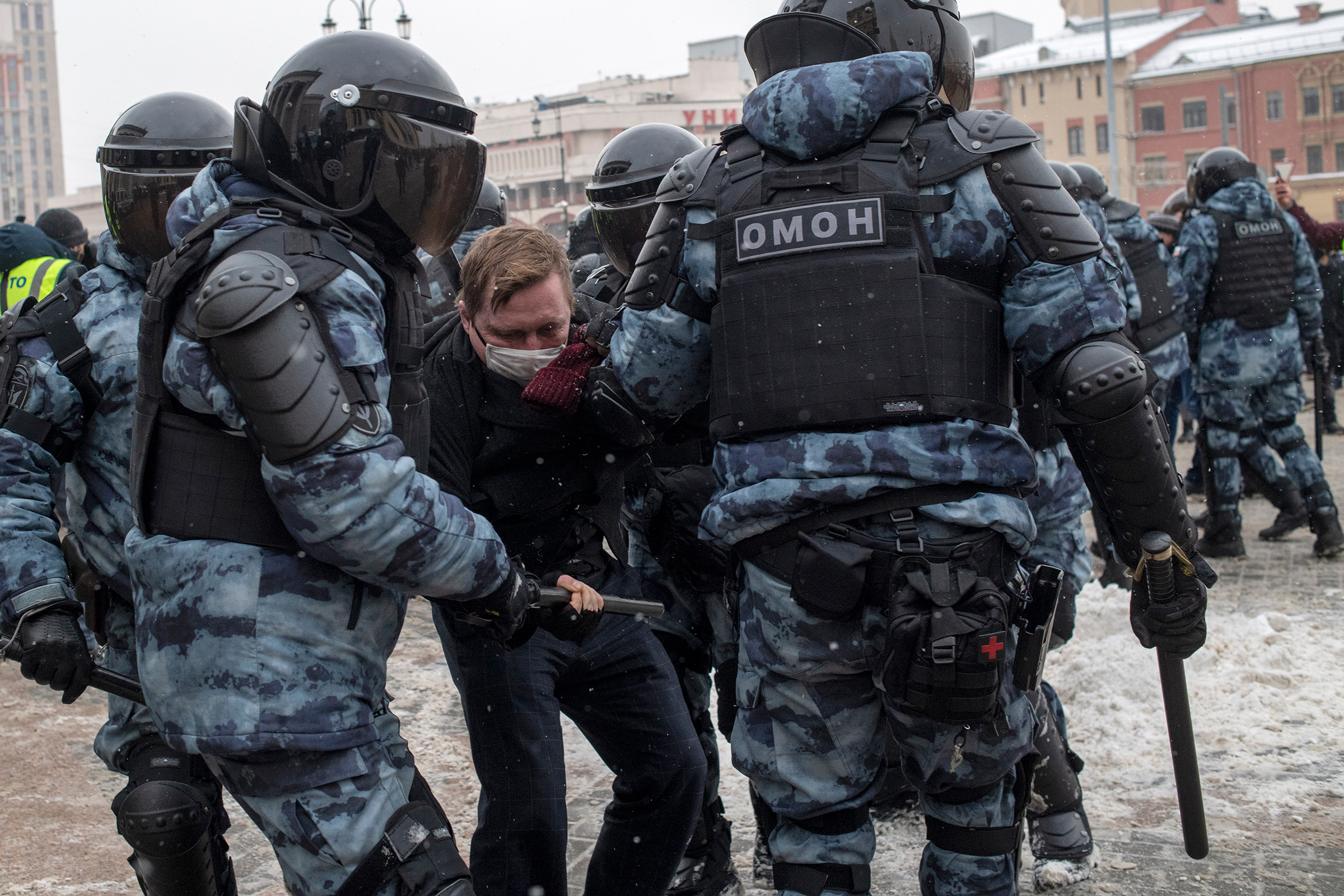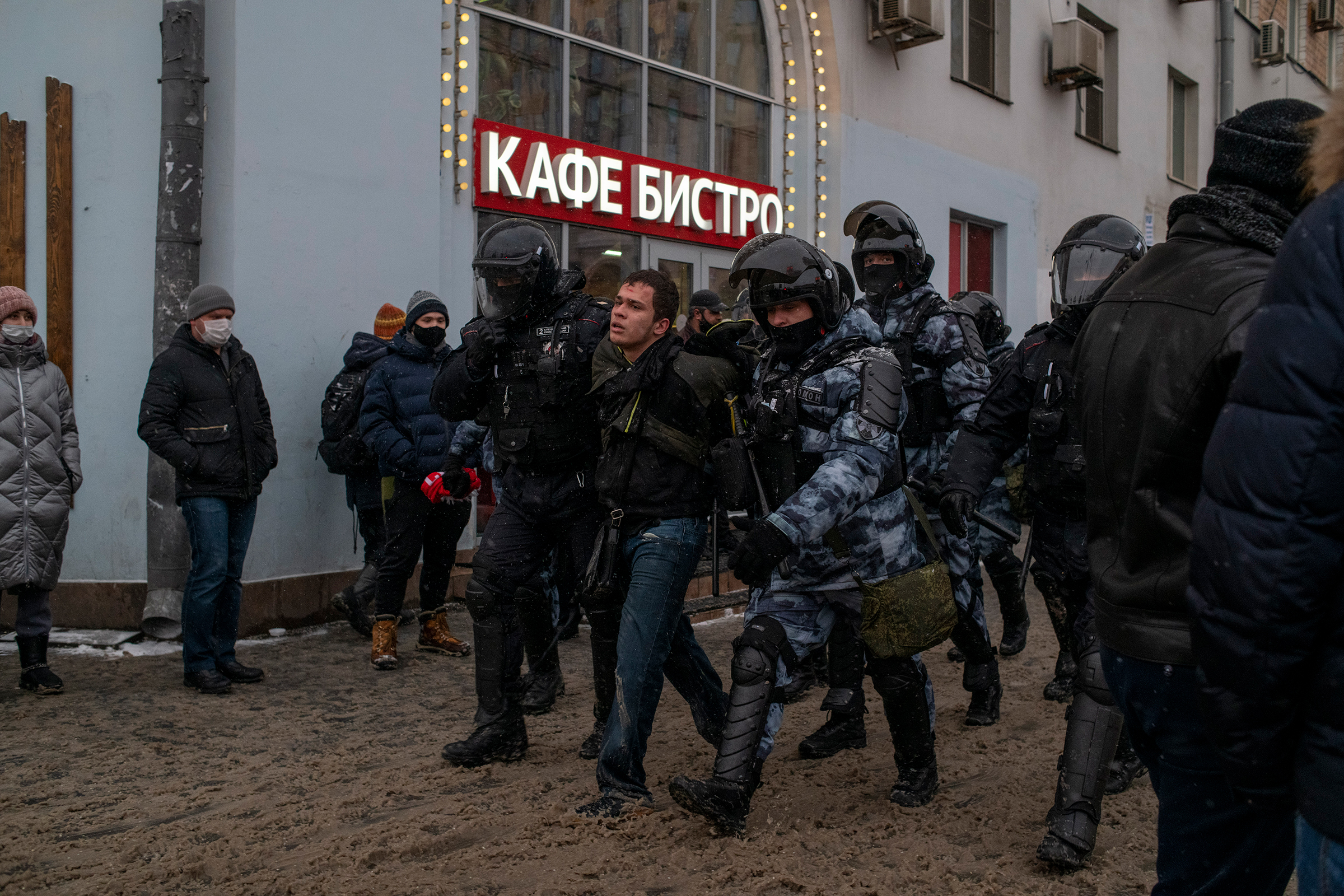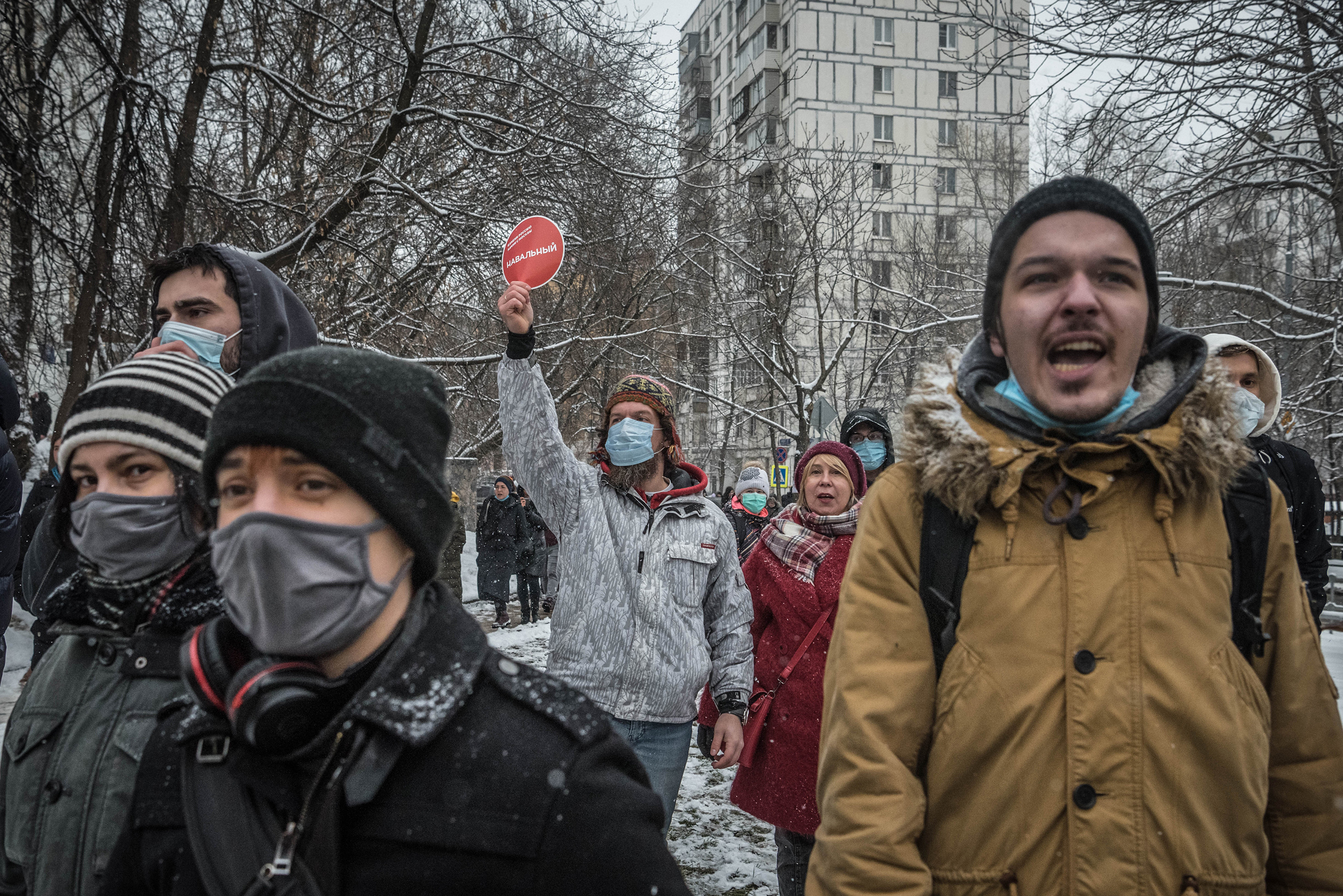Marina Shakhov never took to the streets to voice her opposition against President Vladimir Putin until recently. In the protests that began on Jan. 23 and repeated the following weekend, the 31-year-old sales representative marched with several hundred people, braving temperatures of 3F in the Siberian city of Tomsk. Just a five minute walk away from the protest’s meeting point – the city center’s Novo-Sobornaya square – is The Xander Hotel, where opposition activist Alexei Navalny was allegedly poisoned by a powerful nerve agent last August. Protestors chanted “Navalny we are with you” and “Putin is a thief!”.
Shakhov says she does not support Navalny politically but has become “actively opposed” to the government this past year as the economic gap between the elite and ordinary people has widened. “I protested for myself and for the younger generation. I don’t want to live in a country full of restrictions, where people are afraid to speak out,” she says.
Tens of thousands of people, young and old, marched in more than 100 cities and towns in Russia during January. The turnout is unusual in a country where political protests in the past 20 years have been concentrated in big cities. Research led by social anthropologist in Alexandra Arkhipova in Moscow found that 42% of them had, like Shakhov, never protested before.

Authorities responded aggressively to last month’s demonstrations. On Jan. 31, police detained at least 5,100 people nationwide, according to OVD-Info, a Moscow-based NGO group that monitors political arrests, surpassing the 3,700 detentions across Russia the prior weekend.
The demonstrations were prompted by the Jan. 17 arrest of Navalny, the country’s best-known opposition activist, on his return from Germany. Another driving force was his viral video exposé, published on YouTube on Jan. 19, claiming that an opulent palace on the Black Sea coast was financed by members of Putin’s inner circle with illicit funds of $1.3 billion (the Kremlin has denied these claims). Navalny—who was sentenced to two years and eight months in prison Feb. 2 in what is widely seen as an attempt by the Kremlin to silence him—has become a rallying point for many grievances about Putin’s 20-year reign.
Alexandra Tokareva, 24, from Moscow decided to join the protests for the first time because of Navalny’s poisoning and the attack on free speech that she says it represents. “I realised that something is wrong with our country. If Navalny could become a victim for speaking openly, I could become one too,” she says. “I really believe him and I want to live in a better country,” she adds. Before, she felt that protests couldn’t change anything. But now she hopes that even if the protests can’t bring about domestic change, they will lead to more international pressure on Russia.
But Navalny is not the only inspiration for the widespread protests. Arkhipova has said that Russians are “unhappy with the economic situation, which has worsened due to the pandemic, [and] unhappy with the lack of government support during the pandemic.” Unemployment is at its highest since 2012 and the economy in 2020, hit hard by the coronavirus pandemic and a drop in oil demand, suffered its sharpest contraction in 11 years. The Kremlin’s Covid-19 support package amounted to just 4% of gross domestic product ($54.3bn), or less than a tenth of the help provided by the U.S, Italy and Germany. Meanwhile, support for Putin’s Just Russia Party fell to a record low 30% in November, and is currently hovering at 31%, according to the state-owned pollster WCIOM.
Last year, Putin passed a series of controversial constitutional amendments – in a referendum that critics said was fraudulent – that could enable him to stay in power until 2036. The move sparked protests in Moscow and St. Petersburg, involving hundreds of people.

But economic inequality is the reason that people are most unhappy with Putin, according to research by Moscow-based independent pollster, the Levada-center. Some 45% of respondents faulted Putin for “failing to ensure an equitable distribution of income in the interests of ordinary people” in 2018, up from 39% in 2015. In Russia, the top 10% own 83% of the country’s wealth, making it the most unequal of the world’s largest economies followed by the U.S. and China, according to Credit Suisse Research Institute in 2019.
Shakhov says she was not “surprised” by the claims made by Navalny in his Putin Palace investigation and believes that those close to Putin live a similarly decadent lifestyle. “Yet, elderly people don’t have money to retire. They do not live, they survive. There is not enough money to help seriously ill children recover. Apparently, they are not worthy of life,” she says.
The protests have broken out across the wide expanse of Russia. In Ekaterinburg, a city 880 miles east of Moscow, Ekaterina Karaman says Navalny’s many investigations into corruption pushed her to protest. “Everyone already knows the government is stealing. State institutions broke down long ago, we see the failure of power with our own eyes; in hospitals, schools, institutes, police stations, city administrations. The whole system needs changing,” says the 28-year-old artist.
She was optimistic about Putin until 2008, she says, when a vote that the Council of Europe deemed flawed put Putin-backed candidate Dmitry Medvedev, then-First Deputy Prime Minister, in the President’s seat. Under Medvedev, Putin served as Prime Minister until 2012, when he became president again. “It became obvious that we have no freedom to vote,” says Karaman.
In September 2017, the artist became a supporter of Navalny after watching him speak to a crowd of people in her hometown during his bid for the 2018 presidential elections (Navalny was later barred from running due to an embezzlement conviction from 2014, which he said was politically motivated). “He talked with the people. This practice is very unusual in Russia, where politicians stay away from the people and never speak openly,” she says.

These protests have been unusual in that they have drawn demonstrators of all ages to the streets. Victoria Ivleva, 61, a photojournalist in Moscow, who also protested, says that in the mid-1990s Russia was “nearly a free country… you could say and do whatever you wanted”. But in the past two decades, Putin has passed legislation limiting the freedom to protest, defaming NGOs as traitors and “foreign agents,” dismantling independent media, and increasing censorship online and in the education system.
Ivleva says that in ten years that she has been actively demonstrating in Russia, she had never seen so many officers in different uniforms trying to control recent protests. “Some of them were police, some of them were OMON [riot police] some of them were something else. I don’t know what. They were like ants all over the place. It was a horrible picture,” she says. “I said, ‘why have you sent so many armed and military people because we’re peaceful? Why are you so scared of us?’” she adds.
The photojournalist says “it doesn’t matter” that Navalny’s political goals did not motivate her to protest. “Of course, I want him to be freed. No one has the right to poison a human being. If we can use Navalny to protest other kinds of ideas, why not participate?” she says.
Shakhov, like many of those who have protested recently, is planning to march again. But how long the demonstrations will last is uncertain. One of Navalny’s chief lieutenants, Leonid Volkov, reportedly told the Moscow Times his supporters would not protest again until later in the year, to build momentum for September’s parliamentary elections.
Putin is certainly unlikely to be dislodged by this bout of unrest. The Kremlin maintained control over society when tens of thousands of people, predominantly in Moscow, protested for political reform in 2012, and again when thousands rallied over corruption in at least 90 cities in 2017.
Yet Shakhov isn’t giving up hope just yet. “Either the protests will gain momentum,” she says, “or the authorities will continue achieve their goals through arrests, fines, intimitation, and people will go back to tolerating and staying quiet.”
More Must-Reads From TIME
- The 100 Most Influential People of 2024
- Coco Gauff Is Playing for Herself Now
- Scenes From Pro-Palestinian Encampments Across U.S. Universities
- 6 Compliments That Land Every Time
- If You're Dating Right Now , You're Brave: Column
- The AI That Could Heal a Divided Internet
- Fallout Is a Brilliant Model for the Future of Video Game Adaptations
- Want Weekly Recs on What to Watch, Read, and More? Sign Up for Worth Your Time
Contact us at letters@time.com
